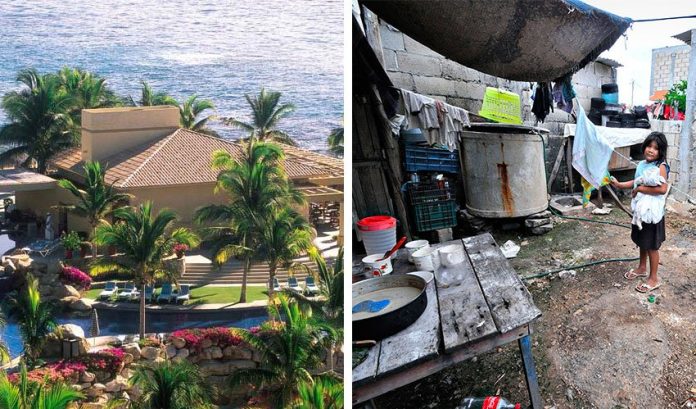When it comes to money and social class, I’m never really sure where I fit in here. I grew up in a somewhat uncommon situation, with well-educated parents who, for the most part, lived paycheck to paycheck for the duration of my childhood.
My grandmother paid for some of the traditional markers of the upper-middle class like braces and ballet classes, but I didn’t learn to drive until I was almost 20: the $100 needed for driver’s ed class was always needed for something more pressing, and I didn’t want to ask my rich uncle (whose trust fund was the reason I was able to go to college).
There was one summer when my mom had lost her job that we ate once or twice a day and relied heavily on the charity of friends and church members before she found something in another city, where we promptly moved.
These aren’t complaints — I had wonderful parents and consider myself to have had a happy and loving childhood. But it’s made for a rather confusing identity when it comes to socio-economic status, especially living now in a country with a quite different system where I’m suddenly in a very different space financially than I’m used to.
Here in Mexico, I’m rich. Not rich rich, but relatively rich compared to most of the population. This doesn’t mean that we never struggle with money problems, but even if it’s somewhat precarious (like many people’s incomes are these days), I live very well compared to how I’d live in the U.S. on the same income. There, I’d be in the bottom 35% of all earners; here, I’m in the top 5%.
Plenty of my paisanos have figured this out too, and the largest “feeder country” of immigrants to Mexico by far is the United States. I feel certain that if more people in the U.S. understood what things were really like down here, that number would be much higher (hey, thanks, fear-mongering news coverage!)
All that said, I can’t help but feel pangs of guilt and whatever the opposite of entitlement is as I see my Mexican friends with similar and greater education, talent and work ethic struggle and hustle to make even half of what I do.
Going to places like San Miguel de Allende, where gringos have been both a boon to the local economy and simultaneously a driver of sky-rocketing housing prices, puts me in an uncomfortable state of mind. Many local economies depend on us, and many hard-working people in those places are priced out of certain luxuries they might otherwise be able to afford as a result of those higher prices.
I found Los Cabos to be a particularly shocking example: opulent wealth of a mostly foreign population on one end, and stagnating poverty on the other, with a very small bilingual merchant middle class between them.
The differences in color were impossible to ignore: for the most part, it was dark brown people serving mostly white people who didn’t speak Spanish. My friend’s husband, who is Mexican and fairly light-skinned (at least in his native Veracruz), was continually being offered tours for “his clients” — my friend and I — as we wondered around an artisans’ market (he’s a highly-respected doctor).
When we spoke Spanish, no one there guessed that we were American, because no one expected Americans to speak Spanish.
I’m not trying to blame my fellow expats; most from the U.S. and Canada that I’ve met down here are lovely, well-meaning people. And of course, the wide gap between the rich and poor is not a new problem, and is certainly not unique to Mexico.
Most foreigners here that I know go out of their way to be fair and kind to those that serve them (dare I say, in a way that’s much more obvious than their similarly-moneyed domestic counterparts).
But the question we need to consistently reflect on is this: what is fair? Is there a way to counteract the latent functions of a booming tourist industry with low-wage workers that provide so many aspects of what for most of us is an extremely privileged life?
When a taxi driver or an artisan purposefully overcharges me, I often wonder if there’s an element of cosmic justice in it. If someone gets 20 extra pesos out of me that make a difference for them but not really for me, is it something I should bother fighting on principle, or let go?
These aren’t questions I have the answers to, and the oceanic force of the globalization of markets is obviously not something we as individuals have much control over. But as drops in the ocean I often wonder: what are our responsibilities as good immigrants to a system that unfairly favors us on a number of fronts?
When people ask me for specific phrases in Spanish, I usually tell them the most polite version possible. I believe it’s important to always risk being too polite rather than too casual, and I think this is a good rule of thumb for immigrants in general.
How can we do this? First, for goodness’ sake, learn Spanish. Don’t “jump the line,” literally or metaphorically, just because you can and people let you. Try to keep most of your complaints about Mexico to yourself, or at least out of earshot of your hosts. Make local friends and join in community events. Support local business that don’t just cater to tourists.
As immigrants all over the world will tell you, we become automatic representatives for everyone from our respective countries. We can’t always alleviate the built-in injustices inherent in our privileged positions, but we can at least be gracious and grateful.
Sarah DeVries writes from her home in Xalapa, Veracruz.
